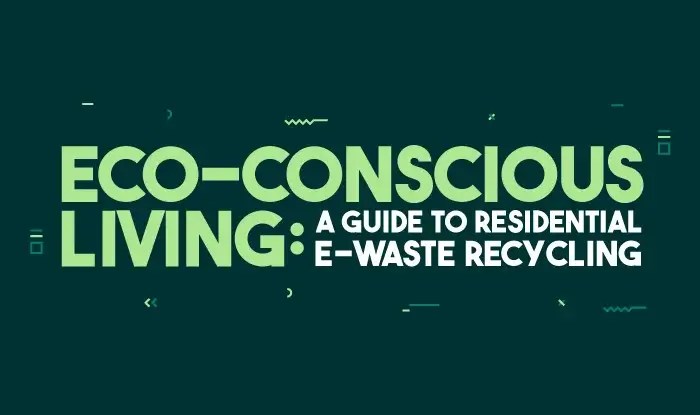
Eco-conscious living and electronics consumption have become two enmeshed concepts. You can’t address one without solving the other. The more reliant we become on our devices, the more tangled these two get.
How does e-waste recycling get into the picture?
Consider this: To access the latest digital tech advances, you have to have your laptops, smartphones, and other tech devices fully updated with the latest software upgrades. If you don’t,
So you have to buy a new laptop or phone every 3-4 years, even if you don’t want to. If you run a business, that means an IT infrastructure upgrade every few years. If you have a family, that means all of you changing your devices in quick and regular intervals, creating a pile of outdated tech in an old drawer or the basement.
For those of you keeping count, that is an insane amount of electronic waste we generate at unprecedented speeds. According to the World Economic Forum, the US is responsible for producing about 46 pounds of e-waste per person. On average. Every year.
If you’re an eco-conscious consumer who doesn’t want to participate in this vicious cycle of digital consumption, it may seem like a complex problem to deal with.
But there are solutions. The first and foremost is eco-conscious living itself.
Eco-conscious living is a lifestyle of minimal and mindful consumption. You not only use fewer resources but also use them mindfully and maximize their use. You don’t buy and discard. You think before you buy; you buy what costs the environment the least amount of resources; and you use that product to the maximum of its use and life.
Sometimes even creatively thinking of its uses, and sometimes repurposing it altogether to extend its utility.
Eco-conscious living reduces your impact on the environment and makes you an asset to the planet’s life around you. Its ideal goal is a zero-waste life where you generate almost no waste and adopt sustainable lifestyle choices in everything you do. Including residential e-waste recycling.
What does residential e-waste consist of? It includes a wide range of electric and electronic products that we use every day. Laptops, desktop computers, smartphones, refrigerators, HVAC units, toasters, flashlights, lamps, and wires are all common examples of residential e-waste.
Since modern lives cannot be sustained without electronic products, it’s critical to handle them with care — from production to end of life.
What are recycling best practices that ensure the success of your residential e-waste disposal?
Considering how massive the global digital gap is, the most eco-friendly thing to do is donate your old but useful tech to those who need it. Schools in your district and libraries are some of the best places. Or you can find families around you that might need an old computer for their young child to get familiar with the technology.
If your device is too old to be functional or broken, it’s best to look for a local e-waste recycler and dispose of your devices ethically.
In 25 states plus the District of Columbia, it’s illegal to dispose of e-waste with regular trash. It’s also illegal to dump e-waste into landfills if you’re not a proper recycler as e-waste contains some of the most valuable as well as toxic materials on earth.
Proper e-waste recycling extracts valuables from discarded electronics and handles the toxic substances separately.
When mapping out your eco-conscious lifestyle, it’s necessary to look for the most optimum solutions to reduce your impact on the environment. Responsible e-waste handling is one of the most effective ways to reduce the backlog of discarded waste and rid the environment of its toxic effects.
Hummingbird International is a professional e-waste recycling service. With a strong focus on sustainable electronic e-waste disposal, we offer American households and families free e-waste recycling services. Through these easy-to-access and hassle-free solutions, we encourage more people to actively participate in e-waste disposal and create a more healthy environment for everyone around.
Call us at (888) 392-7839 to learn more.
<a href="https://hummingbirdinternational.net/eco-conscious-residential-e-waste-recycling/"><img src="https://hummingbirdinternational.net/wp-content/uploads/2024/05/Eco-Conscious-Residential-E-Waste-Recycling.jpg" alt="[INFOGRAPHIC] Eco-Conscious Living: Your Guide to Residential E-Waste Recycling" title="[INFOGRAPHIC] Eco-Conscious Living: Your Guide to Residential E-Waste Recycling"></a><br />By: <a href="https://hummingbirdinternational.net/">Hummingbirdinternational.net</a>
Kelly Sampson is a writer, blogger, and environmental enthusiast. She has strong opinions about climate change, the dogs vs. cats debate, and Oxford commas. She has lent Hummingbird International her engaging and spirited voice and turned our blog into a great place to find valuable information about e-waste, e-waste recycling, and the ITAD industry. Explore our blog to read more of her work.